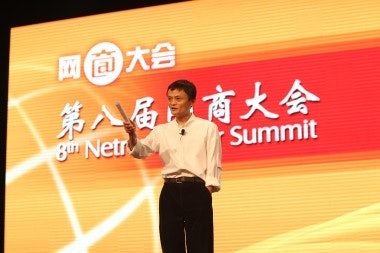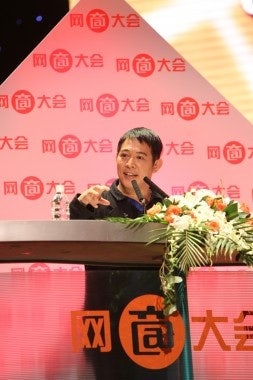A Day Of Hyperconnectivity And High-Tech#

Jack Ma of Alibaba speaks at AliFest 2011
This past weekend, Jing Daily attended Alibaba.com's 8th annual AliFest in Hangzhou, a day-long conference featuring guest speakers and panels covering today's increasingly interconnected online world and the 12-year-old company's current and upcoming projects.
After stopping by the Net Products Fair -- a trade show of sorts featuring products sold by independent Taobao vendors from China, Korea and Japan -- in the morning, we attended the afternoon session of AliFest's Netrepreneur Summit, at which guest speakers included Thomas Friedman and Jet Li.
Taking the stage after a choreographed dance routine, Alibaba co-founder Jack Ma (马云) gave a short speech introducing the New York Times columnist and author Friedman. Speaking via satellite conference, and paraphrasing his most famous book, Friedman joked that he was glad "the world is flat" enough for him to attend the conference from his hometown of Minnesota. Discussing his new book, Friedman discussed the "hyperconnectivity" of today's digital world, noting that disturbances in the American, or Chinese, economy now have severe effects around the world and that both countries essentially face the same macro-level problems. Though America and China approach their economic or social problems at different stages of development, Friedman suggested, the most pertinent issue facing both hinges on a challenge of education. Friedman said that the speed with which new technologies enter and influence our lives has increased exponentially even since he wrote The World is Flat, making us all "hyperconnected, interconnected and interdependent."
Noting that competition is becoming increasingly fierce as companies around the world now have access not only to cheap labor, but also to "cheap geniuses," Friedman wrapped up by advising everyone in the audience to think creatively to "find their extra," that which will set them apart from the pack in a small but valuable way.
Next, Alibaba Group chief architect, Wang Jian discussed the speed of adoption of mobile wireless technology in China, saying that Alibaba's decision to enter the mobile OS market and cloud computing this year was a tactical decision, since hundreds of millions of Chinese now depend on their mobile phones not only for making calls, but shopping, doing business, and dealing with their finances.

Dancer at the launch of the summit
Following Wang's presentation, Lu Xipeng, Dean of Taiwan University of Science and Technology, delivered a keynote speech about "Channels and the Internet," then welcoming guests like Nelson Yip, founder of the Hong Kong Unleash Foundation, Ye Haifeng of the online handbag-selling platform Mbaobao.com, and Lin Yucheng, CEO of the online and brick-and-mortar Chinese tea merchants Sumcl.com onstage for a panel discussion. From this discussion, perhaps the most important takeaway came from Sumcl's Lin Yucheng, who said the fact that buying tea at a physical store is a far different experience than shopping online presents his business with unique challenges. While his stores rely on attractive salespeople, elaborate packaging, and modern interior design to attract customers, his online store puts the focus on individualized customer service and expert online salespeople, tasked with advising potential customers and presenting themselves as insightful "tea doctors." Lin added that nationwide customer trials and market research helped his company pin down regional differences, giving his staff a better understanding of which teas to recommend to clients throughout the country.
Next, actor and (with his One Foundation) philanthropist, Jet Li took the stage to raucous applause to discuss his experience as an actor and, more recently, entrepreneur. Discussing the role of failure and setback, then success, in his early career, Li introduced his newest business venture, Taijichan (Taichi Zen), a culture-focused company co-founded with Alibaba's Jack Ma. Li said that, in his view, physical fitness is directly correlated with personal happiness, and went on to state the influence of martial arts and tai chi in his ability to cope with stress. As entrepreneurs, he told the audience, it's important not only to "be [physically] healthy in order to be happy," they have to put a priority on giving back to the community via charity work.
Further discussing his new venture, Jet Li said that the combination of tai chi and Zen (Chan) Buddhism to be taught in his Taichi Zen schools can become something of a "cultural product" of China, one that appeals to people around the world. Li likened this type of readily identifiable cultural product to Hollywood for the U.S., yoga for India, and espresso for Italy, adding that he thought a country can't be truly "great" until it becomes a cultural, rather than simply an economic, force domestically and globally.

Jet Li speaks at AliFest 2011
While the crowd seemed ecstatic simply to see Jet Li and hear him speak, his comments on the role of philanthropy in China, and the obligation of young Chinese to help others, even if they only donate one yuan a month or contribute one hour a month to charity work, stood out in a day devoted mainly to commerce and technology.
Wrapping up the afternoon, Jack Ma delivered a speech about "Creative Destruction, Ecosystem, and Returning to Our Roots." The candid, half-hour speech and Q&A covered everything from the Alibaba Group's efforts to increase transparency and openness in the wake of controversies earlier this year, adding that making changes to existing systems -- rather than tearing them down -- will help his Group stay competitive in a cut-throat Chinese (and global) digital market. Discussing his company's rivalry with other Chinese online companies, Ma said Alibaba's decision to get involved with areas as diverse as search engines and finance was driven by a desire to make sure his competitors "don't sleep well at night," keeping companies that are reluctant to change in response to market conditions and consumer demand from becoming complacent.
After discussing new features his company is including in its e-commerce platforms for large-scale commercial buyers, Ma said that one of the most important changes to come to China via the growth of the e-commerce market is the education of Chinese consumers. While consumers used to never second-guess whether a product was counterfeit, online shopping has made them wiser and more skeptical, Ma said, a move that has pushed along Alibaba's upcoming "Physical Check" feature, which entails company reps personally inspecting the facilities of every Gold Seller. Wrapping up by discussing the importance of charity, noting that even if the cause to which you donate your money doesn't change through the simple act of giving, "charity changes you," Ma said the crucial thing for entrepreneurs (whether online or brick-and-mortar) is to keep their competitors on their toes, forcing them to change even if they don't want to, via better customer service, features, and product knowledge. Wrapping up his speech, Ma opened up the floor for an audience Q&A, offering his advice to attendees about their online ventures, and concluded the event.
While there were few surprises over the course of the day -- save for an overly enthusiastic audience member who wrested away a microphone from another attendee to ask a rambling question -- the reiteration by Ma and Jet Li that simple economics aren't enough for China or its population, and that philanthropy is critical even now, in China's intermediate stages of economic development, was one of our key takeaways of the summit.
Surrounded by booming Hangzhou, a city increasingly studded with Mitsuokas and Lamborghinis, luxury malls and high-rise, high-end apartment blocks, the broader focus on philanthropy and culture over the course of the day was a breath of much-needed fresh air.
Jing Daily attended 2011 AliFest as a guest of the Alibaba Group. The Jing Daily team would like to thank Rebecca Lui, Bonnie Cheung, John Spelich, and the Alibaba.com communications team for their hospitality.